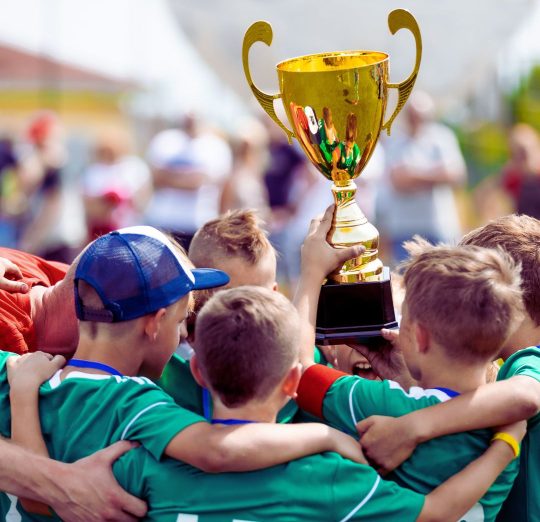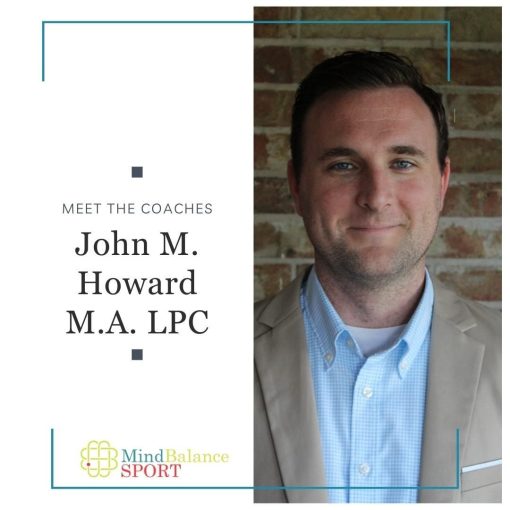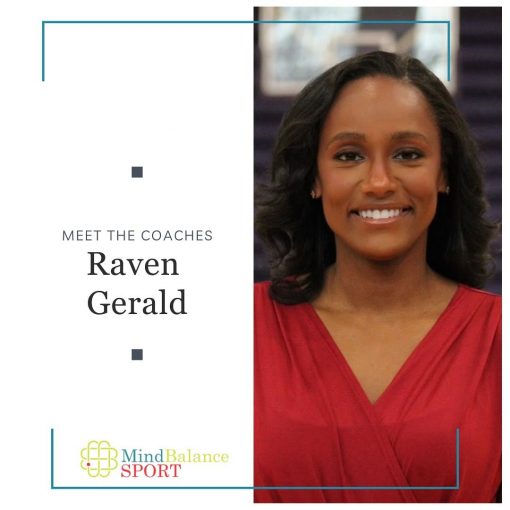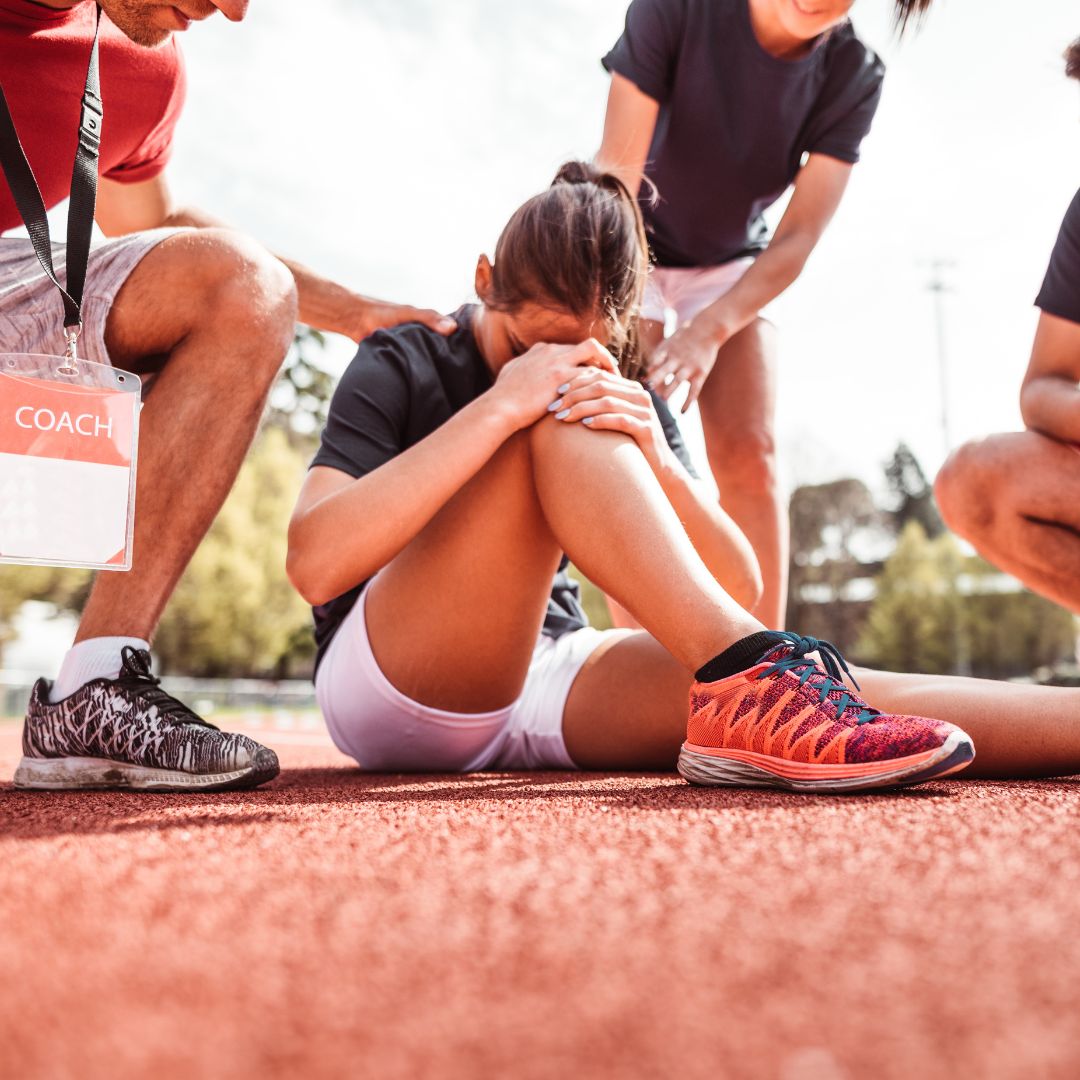Sports Psychologist in Fairfax, VA
You want to work on your mental game, but how do you train your brain?
At MindBalanceSPORT, We Train The Other Half Of The Athlete.
You want to work on your mental game, but how do you train your brain?
Mental training does not get much media attention, but at MindBalanceSPORT we know it is a game changer. The mental skills you will learn at MindBalanceSPORT are generalizable in the classroom, in sport and in life!
We know that mental skills can be successfully taught, even at an early age.

Our Services
Meet the Team





testimonials
Athlete Stories: Real Comebacks, Real Results

Emma, a high school basketball player, tore her ACL in the middle of her junior season. After surgery, she struggled with self-doubt and fear every time she stepped back on the court. Through sport psychology training, she learned visualization techniques and confidence-building exercises that helped her regain trust in her knee. When she returned for her senior season, she didn’t just play—she led her team to the playoffs.

Carlos, a soccer player, suffered a stress fracture in his foot and had to miss half of his season. Sitting out was mentally tougher than the pain itself. We worked on mental engagement strategies to keep him sharp—studying game film, setting small rehab goals, and using mental imagery to stay ready. When he was finally cleared, his confidence never wavered.

Jordan, a track athlete, strained her hamstring before a major competition. She feared losing speed and falling behind competitors. Instead of focusing on what she couldn’t do, we redirected her energy toward mental preparation, using self-talk and goal setting to keep her confidence strong. When she returned, she set a new personal record.
EXCELLENTTrustindex verifies that the original source of the review is Google. It was a great help to my 14-year-old competitive volleyball player daughter. Raven was great to understand and connect with her from start to end. We will continue with our sessions as needed.Trustindex verifies that the original source of the review is Google. Great results! I’ve loved working with Paula. Our sessions have greatly improved both the physical and mental aspects of my tennis game. I’m playing better and having more fun! Highly recommend!Trustindex verifies that the original source of the review is Google. Our family had a wonderful experience with Paula Castro. We needed some additional confidence in a particular area/sport and Paula helped get us there. We know who to turn to if we need help again. She’s been a Blessing. Thank you, Paula!Trustindex verifies that the original source of the review is Google. I highly recommend MindBalanceSPORT. Our son works with John Howard. John is very caring, positive, and effective at working with teenagers. John is an adept listener and created an individualized plan tailored to our son’s personality. After just a few sessions with John, we noticed a significant improvement in our son’s motivation and mental approach to sports and life in general. Our son looks forward to meeting with John and tells us that he benefits immensely from their connection.Trustindex verifies that the original source of the review is Google. Paula Castro is an outstanding professional on the field. She has helped my daughter improve her confidence, preparation, and thanks to these session she feels more prepared and motivated. Paula takes the time also to share (what she can) and align with us as parents to be on the same page. Strongly recommended!Trustindex verifies that the original source of the review is Google. MineBalanceSPORT has quickly become the area's expert in sports psychology. Their reputation is well deserved given their incredibly thoughtful, scientifically based approaches to treating performance-related conditions, and I have only heard glowing, positive feedback from those who have engaged in their program. I will also add that Drs. Jones and Chirby presented to us (our group comprises of 15+ doctors and masters level clinicans) about their program and impressed us all with their level of expertise and passion for this field. I give them my highest recommendation.Trustindex verifies that the original source of the review is Google. Dr. Jones was beyond helpful to me throughout our time together. If you are an athlete and you need advice or assistance this is the place to come to. She completely changed my outlook and mindset in a time when I needed her most. I look forward to staying in touch with her and am forever thankful for her expertise.Trustindex verifies that the original source of the review is Google. Paula has been a huge help with my daughter Morgan coming off her injury. It’s been 18 months since she’s played basketball and she’s thriving because I know Paula is guiding her the right direction. As a mother, I’m extremely gratefulTrustindex verifies that the original source of the review is Google. If you are looking for Amazing Psychologists who can help support you in your sports performance, you need to call MindBalanceSPORT! Dr. Chirby and her colleagues are a wealth of knowledge, they have so many helpful techniques for mind balance, and they have so much compassion for the communities that they serve! Highly recommend!!!
Recovery
While Everyone Has A Physical Ceiling, There Is No Mental Ceiling.
How Sports Psychologists in Fairfax, VA Help Athletes Recover from Injuries and Improve Performance
How Sports Psychologists in Fairfax, VA Help Athletes Recover from Injuries and Improve Performance
Music has long been recognized as a tool for relaxation and emotional regulation, but its role in sports recovery and performance is increasingly gaining attention. For athletes recovering from injuries or looking to enhance their physical and mental capabilities, music can serve as a powerful medium. Its ability to influence mood, reduce stress, and even impact physiological processes makes it a valuable resource in sports psychology.
How a Sports Psychologist Near Me Can Use Music to Boost Recovery
- Pain Management: Music stimulates the release of endorphins—natural painkillers—helping injured athletes cope with discomfort during rehabilitation sessions.
- Stress Reduction: Calming music decreases levels of cortisol (the stress hormone), promoting faster healing by reducing inflammation caused by chronic stress.
- Improved Motivation: Upbeat tracks can boost energy levels and keep athletes motivated during grueling therapy routines or training programs.
Types of Music Used in Athletic Recovery
| Type of Music | Purpose | Effect on Athlete |
| Slow-tempo instrumental | Relaxation during post-injury rehabilitation | Promotes calmness; reduces anxiety |
| Upbeat rhythmic tracks | Motivation during physical activity | Enhances focus; sustains energy |
| Ambient nature sounds | Stress relief after injury | Improves mindfulness; lowers heart rate |
Athletes often find value in customizing playlists tailored to their preferences while keeping therapeutic goals in mind.
Practical Applications for Athletes
- Incorporate Music into Warm-Ups: Select songs with moderate tempos to ease into workouts while synchronizing breathing patterns.
- Rehabilitation Exercises: Play calming music during physiotherapy sessions to help alleviate fear or frustration tied to slow progress.
- Motivational Playlists: Create curated playlists featuring high-energy tracks that align with personal taste for pre-game routines or difficult workouts.
- Guided Imagery Sessions: Combine soothing music with visualization techniques to mentally rehearse successful outcomes or coping strategies.
Enhancing Performance Through Rhythm Synchronization
One fascinating aspect is how rhythm synchronization enhances athletic output. Studies suggest that syncing movements to musical beats can improve motor coordination and endurance—a process known as “auditory-motor synchronization.” This is particularly helpful for runners, rowers, or swimmers who benefit from maintaining consistent pacing.
For example: – Runners may use tracks with beats-per-minute (BPM) matching their ideal stride frequency. – Swimmers could utilize underwater audio systems designed specifically for rhythm-based motivation during laps.
A Holistic Approach
Integrating music into an athlete’s recovery plan fosters not only physical healing but also emotional well-being. Whether dealing with injury-related setbacks or striving toward peak performance levels, incorporating carefully selected auditory elements offers measurable advantages across various stages of training and recovery processes.
Exploring the Benefits of Sports Counselling in Fairfax, VA for Trauma and Mental Recovery
Sports injuries don’t just affect the physical bodies of athletes; they often leave behind psychological scars that can be just as debilitating as the physical ones. The process of recovering from these injuries involves addressing both physical rehabilitation and mental health. To better understand this, it’s essential to explore the neuroscience behind sport trauma and how athletes mentally recover from their setbacks.
The Brain’s Response to Sports Trauma
- Fight-or-Flight Response: The injury often triggers the autonomic nervous system (ANS) into “fight or flight” mode, releasing stress hormones like cortisol and adrenaline.
- Pain Perception in the Brain: Chronic pain from injuries repeatedly activates regions like the prefrontal cortex, amygdala, and anterior cingulate cortex, heightening emotional distress.
- Fear Conditioning: Some injured athletes experience lasting fear of reinjury, which may stem from hyperactivity in brain areas like the amygdala. This fear can hinder confidence during recovery.
Understanding these initial neurological responses is crucial for applying tailored psychological interventions during recovery.
Mental Challenges Arising From Sports Injuries
- Fear about returning to play.
- Generalized anxiety stemming from uncertainty about career progression after prolonged recovery periods.
- Reduced serotonin levels due to lack of physical activity post-injury.
- Loss of identity tied to inability to participate in sports.
- Flashbacks or intrusive thoughts about how the injury occurred.
- Avoidance behaviors related to competition or training environments associated with trauma.
- Cognitive Deficits (in cases involving concussions):
- Difficulty concentrating or decision-making.
- Memory problems that interfere with recall during gameplay.
Neuroplasticity and Mental Recovery
One of the most hopeful aspects of modern neuroscience is understanding neuroplasticity—the brain’s ability to reorganize itself after trauma. With appropriate rehabilitation strategies, injured athletes can rewire their brains for mental resilience and performance improvement.
- Mindfulness Training:
Regular mindfulness practices improve connectivity between regions like the prefrontal cortex (decision-making) and limbic system (emotion regulation). - Cognitive Behavioral Therapy (CBT): CBT helps reframe negative thoughts about reinjury into proactive coping strategies that promote resilience.
- Visualization Techniques:
Athletes practicing guided imagery engage neural pathways linked with muscle memory and motor control—aiding both mental preparedness and physical recovery.
Role of Sports Psychologists in Addressing Neurological Recovery
| Area of Focus | Intervention Examples | Outcome |
| Emotional Regulation | Teaching breathing techniques | Reduces overactivation of stress centers |
| Cognitive Restructuring | Challenging catastrophic thinking patterns | Promotes optimism about recovery |
| Behavioral Activation | Encouraging gradual return-to-play steps | Mitigates avoidance behaviors |
By addressing both neural mechanisms affected by sports trauma and subsequent mental health challenges, interventions help athletes rebuild confidence while accelerating overall recovery timelines.
Understanding this science-driven approach allows for creating more effective support structures that cater to both mind and body throughout rehabilitation journeys.
Exploring the Impact of Sports Injuries on Athletes Through Performance Psychology in Fairfax, VA
Sports injuries do not only affect athletes physically but can also have profound psychological consequences if left untreated. While physical rehabilitation is often prioritized, the mental and emotional repercussions of injuries are sometimes overlooked. These untreated psychological symptoms can significantly hinder an athlete’s recovery, future performance, and overall well-being.
Common Psychological Symptoms Associated with Sports Injuries
- Depression: Being sidelined from training or competition can lead to feelings of sadness or hopelessness.
- Anxiety: Fear of re-injury or failure to return to pre-injury performance levels is common.
- Loss of Identity: For many athletes, their sense of self is tied closely to their sport. An injury can disrupt this identity.
- Frustration and Anger: The limitations imposed by injuries may lead to irritability and resentment.
- Reduced Motivation: Prolonged recovery periods can result in a lack of drive to continue rehabilitation efforts.
Long-Term Impacts of Untreated Psychological Symptoms
If these symptoms remain unaddressed, they may manifest into more serious issues that impact an athlete’s career trajectory and personal life.
- Persistent depression and anxiety can evolve into long-term conditions requiring extensive intervention.
- Athletes with chronic mental health problems might struggle to maintain focus or confidence in their athletic pursuits.
- Psychological barriers like fear of reinjury can negatively affect decision-making, reaction times, and overall performance.
- Subconscious avoidance behaviors may develop, preventing full participation in training or gameplay.
- Untreated psychological impacts often isolate athletes from teammates, coaches, friends, and family.
- Feelings of being misunderstood or unsupported exacerbate isolation over time.
- Mental distractions during physical activity increase the likelihood of errors that could lead to reinjury.
- Athletes who feel pressured to return too soon without resolving underlying mental concerns are at greater risk.
| Symptom | Potential Long-Term Impact | Example Scenario |
| Anxiety | Hesitation during gameplay | A soccer player avoids tackles post-injury |
| Depression | Withdrawal from sport entirely | A gymnast gives up after losing motivation |
| Loss of Confidence | Reduced ability to perform under pressure | A tennis player struggles during key points |
Addressing Psychological Recovery as Part of Rehabilitation
- Encouraging dialogue about fears related to recovery or rejoining competition.
- Helping athletes reframe negative thought patterns into positive coping strategies.
- Using visualization techniques that aid in imagining successful returns post-recovery.
- Teaching mindfulness practices for managing stress and staying present during rehabilitation.
By integrating mental health care alongside physical recovery plans, athletes are better equipped for long-term success both on and off the field.
How Auditory Stimulation Enhances Sport Performance Training in Fairfax, VA for Athletes
Auditory stimulation is an innovative approach in sports psychology and rehabilitation, focusing on enhancing an athlete’s mental and physical recovery by influencing the autonomic nervous system (ANS). The ANS regulates critical bodily functions, including heart rate, digestion, respiratory rate, and stress responses. For athletes recovering from injury or seeking peak performance, retraining this system is vital. By strategically using sound and auditory cues, athletes can regain balance between the sympathetic (fight-or-flight) and parasympathetic (rest-and-digest) branches of their nervous system.
Understanding Auditory Stimulation in Sports Recovery
- Reduce stress levels: Calming sounds stabilize cortisol levels and reduce overactivation of the sympathetic nervous system.
- Promote relaxation: Low-frequency auditory stimulation encourages parasympathetic activation for better recovery.
- Enhance focus: Binaural beats or rhythmic patterns improve concentration during training or competition.
- Support emotional regulation: Specific auditory techniques can help athletes process feelings of frustration or anxiety linked to injury.
Key Benefits for Athletes
- Faster Recovery from Injury
Injuries often prompt physiological stress responses that prolong healing time. Sound therapy helps regulate these responses by calming the body’s heightened alert state. - Improved Sleep Quality
Auditory interventions like soothing melodies or white noise reduce insomnia—common among athletes dealing with pain or performance pressure. - Enhanced Cognitive Performance
Focused sound stimulation supports improved cognitive function under pressure by reducing mental fatigue. - Stress Regulation During Competition
Controlled exposure to auditory tools aids in managing pre-performance nerves while maintaining readiness.
| Benefit | Mechanism | Example Tools/Techniques |
| Stress Reduction | Activation of parasympathetic system | Meditation music |
| Enhanced Brain Function | Synchronization of neural oscillations | Binaural beats |
| Muscle Relaxation | Reduced muscle tension via calming sounds | Isochronic tones |
| Emotional Regulation | Promotes mindfulness and stabilization of mood | Guided audio therapy sessions |
Practical Applications for Athletes
- Pre-game preparation: Listening to specific tracks designed for focus increases readiness before competition.
- Post-practice relaxation: Using low-frequency sounds after workouts enhances physical recovery by activating restorative bodily processes.
- Visualization practices: Incorporating auditory cues during mental imagery sessions sharpens motor skill learning and strengthens mind-body connections.
Final Thoughts on Implementation
Integrating auditory stimulation into athletic recovery programs requires personalization. Athletes respond differently to types of sound depending on their physiology, preferences, and psychological needs. Collaborating with a trained sports psychologist ensures that chosen methods align with an athlete’s goals, fostering resilience both mentally and physically.
By retraining the autonomic nervous system through targeted auditory inputs, athletes gain not only enhanced recovery but also improved overall performance potential—empowering them to excel in high-pressure environments while maintaining long-term well-being.
How a Sports Mental Coach in Fairfax, VA Utilizes Auditory Stimulation for Sport Injury Recovery
Auditory stimulation has emerged as a promising tool in the recovery process for athletes dealing with sports injuries. By leveraging sound therapy techniques, music, and specific auditory frequencies, psychologists and rehabilitation specialists have found innovative ways to expedite physical recovery while addressing the psychological impact of injuries. This case study examines how auditory stimulation was used to support an injured athlete’s recovery journey, providing insights into its application and success.
The Athlete’s Background
The subject of this case study was a professional soccer player who suffered a severe ACL tear during competition. Beyond the physical challenges associated with the injury, the athlete experienced significant anxiety and mild symptoms of depression due to being sidelined during the competitive season. These psychological barriers hindered their motivation to engage fully in traditional rehabilitation exercises.
- Persistent pain perception even after surgery
- Fear of reinjury affecting commitment to physiotherapy
- Difficulty sleeping due to stress and emotional strain
- Limited focus during mental visualization practices
Implementing Auditory Stimulation Therapy
- Frequencies within 6–8 Hz (theta range) were incorporated to help reduce anxiety levels and improve emotional regulation. This aimed to calm overactive neural pathways linked with stress responses.
- Delta wave frequencies (1–4 Hz) were used before bedtime to promote deeper sleep cycles, aiding overall recovery.
- Pre-selected playlists featuring slow-tempo instrumental music helped reduce physiological arousal levels during therapy sessions.
- Music positively influenced heart rate variability (HRV), supporting autonomic nervous system balance essential for healing.
- Guided meditations with background soundscapes encouraged mental rehearsal of successful athletic movements post-recovery.
- These sessions strengthened neurological connections between motor imagery and actual movement patterns.
- White noise generators were occasionally used during physiotherapy exercises to mask pain signals perceived by the brain.
- Low-frequency sounds helped stimulate endorphin release, alleviating discomfort naturally.
Progress Over Time
| Metric | Pre-Auditory Intervention | Post-Auditory Intervention |
| Sleep Quality | Inconsistent & fragmented | Restorative & uninterrupted |
| Anxiety Levels | High | Mild |
| Physiotherapy Engagement | Hesitant | Fully Committed |
| Pain Perception | Intense | Manageable |
Key Takeaways from This Case Study
- Mind-Body Connection Matters: Addressing an athlete’s psychological well-being is just as crucial as treating physical injuries when striving for successful outcomes.
- Customizable Interventions Are Effective: Tailoring auditory stimulation based on individual needs ensures better adherence and results.
- Evidence-Based Recovery Tools Can Enhance Results: When combined thoughtfully, tools like binaural beats and music can accelerate healing in ways traditional methods alone may not achieve.
This case underscores that holistic approaches incorporating auditory therapies can make a meaningful difference in an injured athlete’s road back to peak performance—both mentally and physically.
Exploring the Crucial Role of Sports Psychiatry in Fairfax, VA for Athlete Mental Health and Peak Performance
Sports psychologists are vital contributors to the mental well-being and high performance of athletes. In the high-pressure world of sports, physical training alone is not enough to sustain success—mental fitness plays an equally significant role. Below, we explore how sports psychologists enable athletes to overcome mental barriers, manage stress, and maintain peak performance.
Key Areas Addressed by Sports Psychologists
- Techniques such as mindfulness and cognitive-behavioral therapy (CBT) are employed to help athletes manage anxiety during competitions.
- Focused breathing exercises can reduce physiological symptoms like increased heart rate and muscle tension.
- They assist athletes in setting realistic short- and long-term goals.
- Strategies such as visualization help create a clear roadmap for success while maintaining motivation.
- Developing tailored stress management routines, including relaxation techniques or pre-game rituals, ensures optimal focus under pressure.
- Sports psychologists provide frameworks for mentally recovering from injuries or losses, encouraging athletes to view setbacks as opportunities for growth.
- Mental training programs, including tools like concentration grids or meditation practices, enhance an athlete’s ability to block out distractions during critical moments.
The Link Between Mental Health and Physical Performance
| Aspect | Impact on Performance | Role of Sports Psychologist |
| Stress | Can lead to fatigue or reduced coordination | Teach stress reduction techniques |
| Anxiety | Impairs decision-making under pressure | Introduce relaxation methods like progressive muscle relaxation (PMR) |
| Burnout | Reduces motivation and overall energy levels | Encourage work-life balance strategies |
| Confidence Levels | Influences risk-taking behavior during games | Use self-talk strategies to build self-efficacy |
Integration of Mental Training into Daily Routines
- Practicing visualization techniques before drills or games.
- Incorporating group discussions about shared mental challenges within the team dynamic.
- Scheduling regular sessions for mindfulness activities like guided meditation post-practice.
Supporting Athletes Beyond Competition
- Dealing with public scrutiny: Strategies are provided for managing media pressure or criticism on social platforms.
- Post-retirement transitions: Guidance is extended to help former athletes adjust mentally after leaving competitive sports.
- Navigating personal challenges: Issues such as relationship conflicts or balancing academic responsibilities (for younger athletes) are also addressed.
The role of sports psychologists extends far beyond improving game-day performance; they create personalized strategies that ensure holistic well-being for athletes at every stage of their careers—from aspiring amateurs to seasoned professionals navigating life post-retirement. By fostering resilience, focus, confidence, and emotional balance, they help individuals unlock their full potential both on and off the field.








